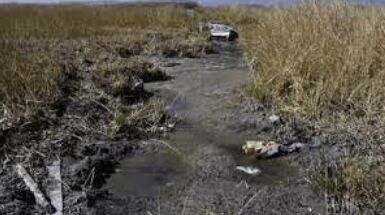Rising despair as Lake Titicaca reaches dangerously low water levels, highlighting the urgent need for climate action
The waters of Lake Titicaca are dangerously low, alarming the local community and raising concerns for the lake's future. Climate change is blamed for the declining water levels, with uncertain prospects for recovery. The situation highlights the global need for action to address the effects of climate change and support affected communities.
The waters of Lake Titicaca are at a dangerously low level, causing concern among the local community and raising alarms about the future of the lake. Pedro de la Cruz, a 74-year-old resident, prayed for rain to come and revive the lake, invoking the spirit of Pachamama, Mother Earth.
The lake, located in the Andes at a high altitude, is experiencing its second-lowest water level in history, with levels within 10 inches of the all-time low set in 1996. The chief forecaster for Bolivia's weather service, Lucia Walper, explained that the falling water levels are a consequence of climate change. She warned that it is probable that the water levels will continue to decline, potentially reaching even lower levels in the future.
Unfortunately, a satellite survey has not yet been conducted to determine the true extent of the lake's shrinkage. Lake Titicaca is one of the world's largest lakes and the highest navigable sea. Its declining water levels have severe consequences for the local ecosystem and the communities that rely on it. The lack of rainfall and reduced inflow from Peruvian rivers hinder the lake's ability to replenish itself during rainy seasons.
Furthermore, the lake is heavily polluted by waste from the nearby city of El Alto and has suffered from overfishing, leading to a decline in species. This issue extends beyond the local community, as it is a global concern.
The recent summit of the Amazon Cooperation Treaty Organization (ACTO) emphasized the need for industrialized countries to fulfill their promises of economic resources to combat climate change. However, the villagers around Lake Titicaca have little hope that water levels will ever return to normal. Without water and rain, their livelihoods are at stake, and their despair grows.
The situation at Lake Titicaca serves as a sobering reminder of the effects of climate change and the urgent need for action. The international community must work together to address this global issue and provide support to those affected by its consequences. Only through collective efforts can we hope to ensure the sustainability and preservation of our natural resources for future generations.




